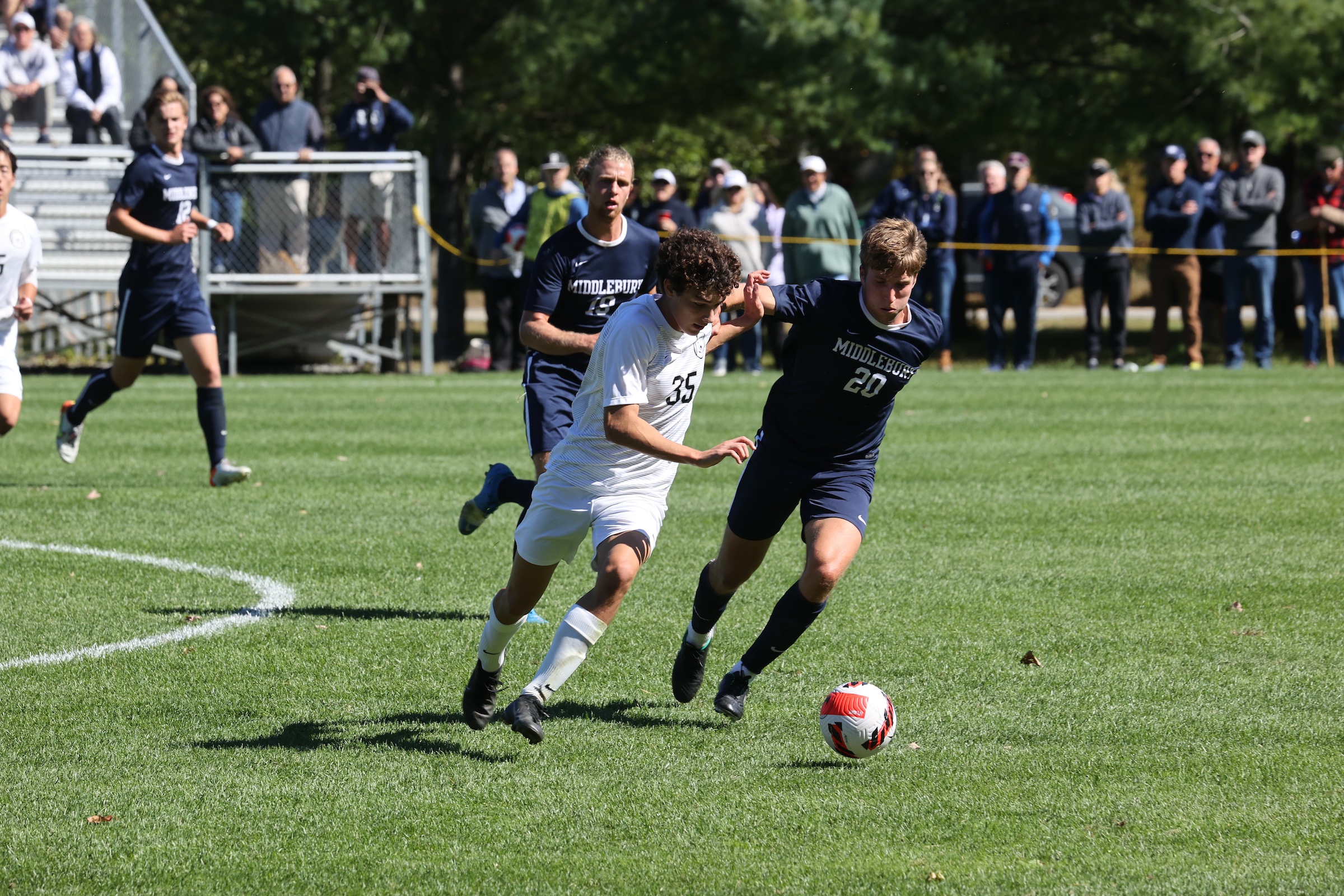Polar Bear of the Week: Tyler Huck ’26
September 1, 2023
 Courtesy of Brian Beard
Courtesy of Brian BeardTyler Huck ’26 does not care all that much about the award he won last season.
The midfielder was named the 2022 NESCAC Men’s Soccer Rookie of the Year, a feat fully deserved on the back of a dream start to Huck’s Bowdoin career.
The Polar Bears outperformed nearly all expectations by not only finishing atop the NESCAC regular season table but also making an NCAA tournament quarterfinals run. To cap the season’s success, the team swept the NESCAC Men’s Soccer awards, winning Player of the Year (Dylan Reid ’22), Coach of the Year (Head Coach Scott Wiercinski) and, of course, Rookie of the Year.
When he was asked about the award, Huck deflected.
“Yeah, something like that,” he said.
Huck is soft-spoken, humble and intentional when he speaks, a pattern not all that different from his style of play. You would not be surprised when you learned of his on-the-pitch talent from looking at him, but you certainly would not assume it at first glance. Captain and defensive midfielder Julian Juantorena ’23 admitted he was slightly confused the first time he met his new teammate back in 2021.
“I remember seeing him for the first time and thinking, ‘what is coach doing? Who is this scrawny kid?’” Juantorena said.
Juantorena’s first impression did not last long. After a year of playing in the midfield together, the Bowdoin captain found himself amazed by that “scrawny kid.”
“I think he’s probably the most talented player that I’ve seen come into the program. We had [Reid]—NESCAC Player of the Year, Drake [Byrd ’21]—All-American. By a margin [Huck] is the most talented person I’ve seen. Playing with him is incredible.”
Wiercinski was impressed with Huck’s technical gifts but believes his mental attributes—both in terms of attitude and soccer-IQ—are what takes his game to the next level.
“We love having him around,” Wiercinski said. “He plays with a smile on his face all the time. Whether it’s a little technical warm up or it’s the most important moment in the 11 vs. 11 scrimmage in practice, I think he treats them the same as equally valuable.”
Huck views his individual success as made possible by the environment around him, and feels that being surrounded by older players only makes his job easier.
“It took a lot of pressure off me,” Huck said.
When he came into the team at this time last year, the starting 11 was an experienced and older group. A lot of positions were already cemented by upperclassmen, and only a couple spots on the pitch were up for grabs. But Huck did not need a lot of positions to be available. He just needed one.
The first-year started the season opener against the University of New England and never looked back. After nabbing an assist in the 6-0 win against the Nor’easters, Huck went on to start 17 out of the remaining 19 games all year.
But even at his highest moments, Huck’s humility trumps any pride that he might feel.
After scoring a late goal to draw the match against Middlebury 1-1, Huck instinctively pointed to Paul Surkov ’26 who provided him with the assist. Huck then sprinted the entire length of the pitch to reach the Polar Bears’ bench and celebrate with his team—not just those that were playing at the time.
“The smile on his face the whole time—he is a great representation of the program, personality-wise, mentality, maturity and obviously ability as well,” Juantorena said. “He is a delight to know as a person.”
As unique as Huck’s talent is his path to Bowdoin.
Huck was first introduced to the sport in the little Northwest London neighborhood of Primrose Hill. He played his first competitive match at seven years old and was instantly floored by his love of the game. Living equidistant from the River Thames to the Emirates Stadium, Huck was indoctrinated early as an Arsenal fan. Growing up he watched his favorite player, a young Theo Walcott, flourish on the right hand side of the pitch—the same area where Huck now shines in the black and white. Nowadays Huck looks up to Martin Ødegaard (Arsenal’s captain), Lionel Messi (no explanation needed) and other more undersized players with superb technical gifts whose game he tries to emulate.
When he moved to California at 11 years old, Huck’s love of the sport he now had to call soccer followed suit. He knew he wanted to play the game he loved as long as he possibly could, and the opportunity to play at the collegiate level was impossible to pass up. Huck’s first season was nothing short of lively, and one can only imagine his remaining three years in Brunswick will be just as wonderful to witness—a notion Juantorena was eager to agree with.
“I think he’s going to get NESCAC Player of the Year in his time in the league, undeniably,” Juantorena said. “I think he’s genuinely the best player I’ve ever played with.”
From the West Coast to the Midcoast, one thing is for certain, that little seven-year-old boy’s passion still fuels, drives and inspires him today. No matter where he goes or where he plays, Tyler Huck remains North London forever.

Comments
Before submitting a comment, please review our comment policy. Some key points from the policy: